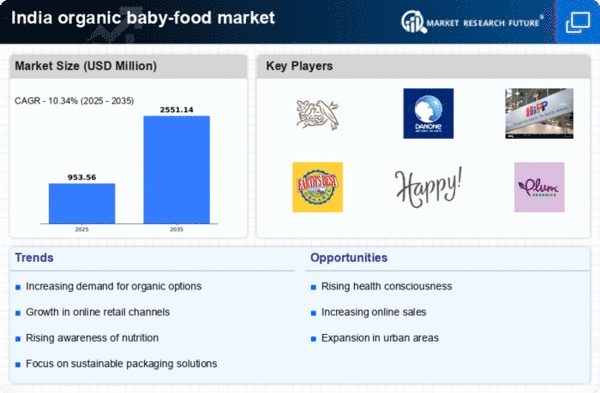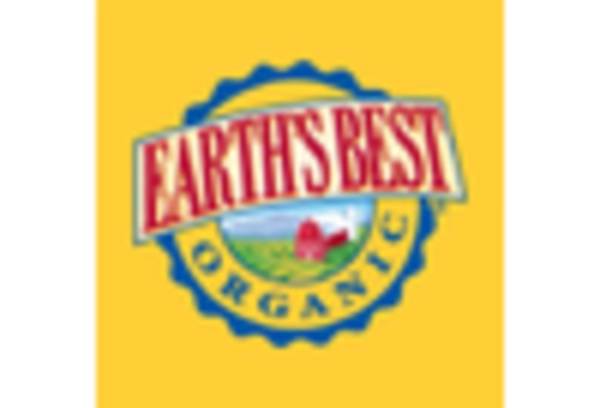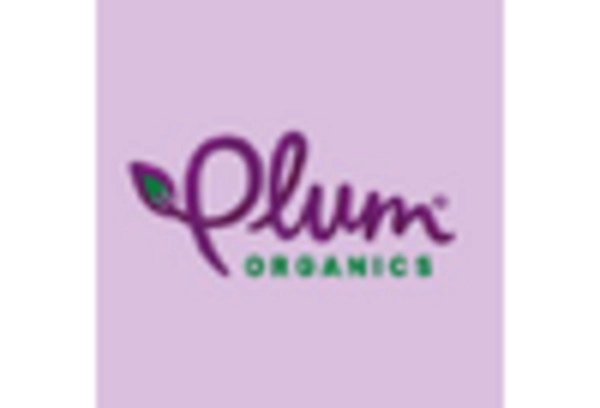Government Support for Organic Farming
The organic baby-food market in India is benefiting from increased government support for organic farming initiatives. The Indian government has implemented various schemes to promote organic agriculture, which includes financial assistance and training for farmers. This support is crucial as it enhances the availability of organic raw materials, thereby facilitating the growth of the organic baby-food market. Recent data indicates that the area under organic cultivation in India has expanded by approximately 50% in the last five years. This expansion not only ensures a steady supply of organic ingredients but also boosts consumer confidence in the authenticity of organic baby-food products. As the government continues to advocate for organic farming, the market is likely to see sustained growth and innovation.
Increased Focus on Clean Label Products
The organic baby-food market in India is witnessing a growing focus on clean label products, which are perceived as healthier and more trustworthy. Consumers are increasingly scrutinizing ingredient lists and seeking transparency in food production. This trend is particularly pronounced among parents who are keen on providing their children with wholesome nutrition. Data indicates that nearly 75% of parents prefer products with minimal ingredients and clear labeling. This shift towards clean labels is reshaping the organic baby-food market, as brands strive to meet these consumer expectations. Companies are reformulating their products to eliminate artificial additives and preservatives, thereby enhancing their appeal to health-conscious parents. As the demand for clean label products continues to rise, the organic baby-food market is poised for further expansion.
Increasing Health Awareness Among Parents
The organic baby-food market in India is experiencing a notable surge due to the increasing health awareness among parents. As more parents prioritize nutrition and health for their children, the demand for organic products rises. This trend is reflected in a 30% increase in sales of organic baby-food products over the past year. Parents are becoming more informed about the benefits of organic ingredients, which are perceived as safer and healthier alternatives to conventional options. This shift in consumer behavior is likely to drive the organic baby-food market forward, as parents seek products free from harmful chemicals and additives. The emphasis on health and wellness is reshaping purchasing decisions, leading to a growing preference for organic baby-food brands that align with these values.
Rise of Health-Conscious Millennial Parents
The organic baby-food market in India is significantly influenced by the rise of health-conscious millennial parents. This demographic is characterized by a strong inclination towards healthy eating and sustainable living. As millennials become parents, their purchasing habits reflect their values, leading to a marked increase in demand for organic baby-food products. Recent surveys suggest that over 60% of millennial parents prefer organic options for their children, viewing them as essential for healthy development. This trend is reshaping the organic baby-food market, as brands adapt their offerings to cater to this health-focused consumer base. The emphasis on transparency in sourcing and production processes further enhances brand loyalty among these parents, driving market growth.
Growing Influence of Social Media and Online Reviews
The organic baby-food market in India is increasingly shaped by the growing influence of social media and online reviews. Parents are turning to digital platforms to seek recommendations and share experiences regarding baby-food products. This trend has led to a significant rise in brand visibility and consumer engagement within the organic baby-food market. Approximately 70% of parents report that they rely on social media for product information, which has prompted brands to enhance their online presence. Positive reviews and endorsements from influencers can substantially impact purchasing decisions, making it essential for companies to maintain a strong digital footprint. As social media continues to play a pivotal role in consumer behavior, the organic baby-food market is likely to experience accelerated growth.

















